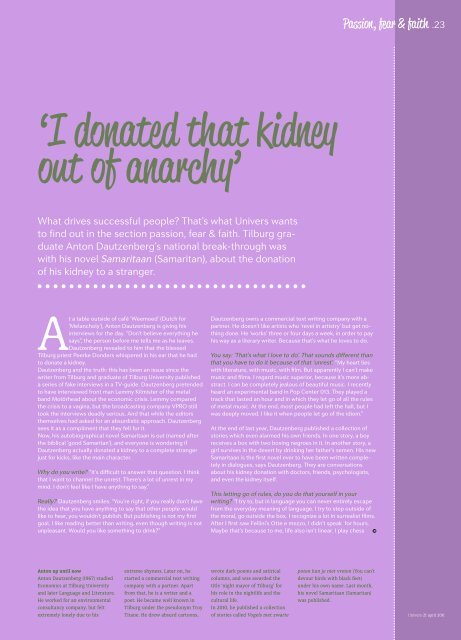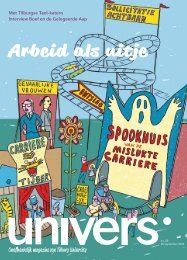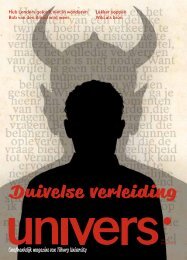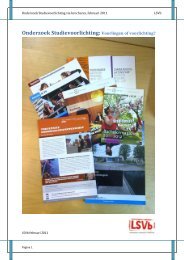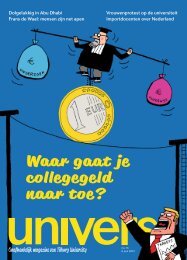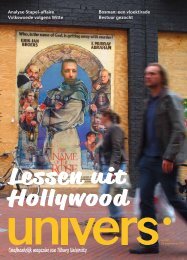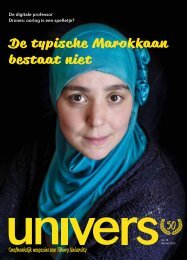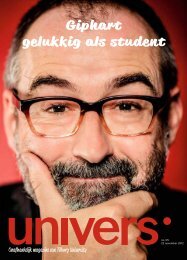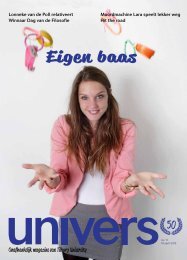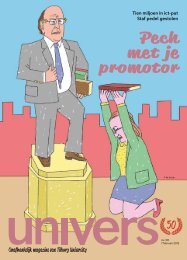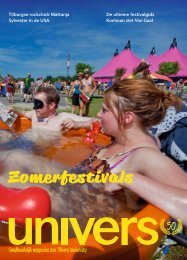Onafhankelijk magazine van Tilburg University
Onafhankelijk magazine van Tilburg University
Onafhankelijk magazine van Tilburg University
Create successful ePaper yourself
Turn your PDF publications into a flip-book with our unique Google optimized e-Paper software.
‘I donated that kidney<br />
out of anarchy’<br />
What drives successful people? That’s what Univers wants<br />
to find out in the section passion, fear & faith. <strong>Tilburg</strong> graduate<br />
Anton Dautzenberg’s national break-through was<br />
with his novel Samaritaan (Samaritan), about the donation<br />
of his kidney to a stranger.<br />
At a table outside of café ‘Weemoed’ (Dutch for<br />
‘Melancholy’), Anton Dautzenberg is giving his<br />
interviews for the day. “Don’t believe everything he<br />
says”, the person before me tells me as he leaves.<br />
Dautzenberg revealed to him that the blessed<br />
<strong>Tilburg</strong> priest Peerke Donders whispered in his ear that he had<br />
to donate a kidney.<br />
Dautzenberg and the truth: this has been an issue since the<br />
writer from <strong>Tilburg</strong> and graduate of <strong>Tilburg</strong> <strong>University</strong> published<br />
a series of fake interviews in a TV-guide. Dautzenberg pretended<br />
to have interviewed front man Lemmy Kilmister of the metal<br />
band Motörhead about the economic crisis. Lemmy compared<br />
the crisis to a vagina, but the broadcasting company VPRO still<br />
took the interviews deadly serious. And that while the editors<br />
themselves had asked for an absurdistic approach. Dautzenberg<br />
sees it as a compliment that they fell for it.<br />
Now, his autobiographical novel Samaritaan is out (named after<br />
the biblical ‘good Samaritan’), and everyone is wondering if<br />
Dautzenberg actually donated a kidney to a complete stranger<br />
just for kicks, like the main character.<br />
Why do you write? “It’s difficult to answer that question. I think<br />
that I want to channel the unrest. There’s a lot of unrest in my<br />
mind. I don’t feel like I have anything to say.”<br />
Really? Dautzenberg smiles. “You’re right, if you really don’t have<br />
the idea that you have anything to say that other people would<br />
like to hear, you wouldn’t publish. But publishing is not my first<br />
goal. I like reading better than writing, even though writing is not<br />
unpleasant. Would you like something to drink?”<br />
Anton up until now<br />
Anton Dautzenberg (1967) studied<br />
Economics at <strong>Tilburg</strong> <strong>University</strong><br />
and later Language and Literature.<br />
He worked for an environmental<br />
consultancy company, but felt<br />
extremely lonely due to his<br />
extreme shyness. Later on, he<br />
started a commercial text writing<br />
company with a partner. Apart<br />
from that, he is a writer and a<br />
poet. He became well known in<br />
<strong>Tilburg</strong> under the pseudonym Troy<br />
Titane. He drew absurd cartoons,<br />
Dautzenberg owns a commercial text writing company with a<br />
partner. He doesn’t like artists who ‘revel in artistry’ but get nothing<br />
done. He ‘works’ three or four days a week, in order to pay<br />
his way as a literary writer. Because that’s what he loves to do.<br />
You say: ‘That’s what I love to do’. That sounds different than<br />
that you have to do it because of that ‘unrest’. “My heart lies<br />
with literature, with music, with film. But apparently I can’t make<br />
music and films. I regard music superior, because it’s more abstract.<br />
I can be completely jealous of beautiful music. I recently<br />
heard an experimental band in Pop Center 013. They played a<br />
track that lasted an hour and in which they let go of all the rules<br />
of metal music. At the end, most people had left the hall, but I<br />
was deeply moved. I like it when people let go of the idiom.”<br />
At the end of last year, Dautzenberg published a collection of<br />
stories which even alarmed his own friends. In one story, a boy<br />
receives a box with two boxing negroes in it. In another story, a<br />
girl survives in the desert by drinking her father’s semen. His new<br />
Samaritaan is the first novel ever to have been written completely<br />
in dialogues, says Dautzenberg. They are conversations<br />
about his kidney donation with doctors, friends, psychologists,<br />
and even the kidney itself.<br />
This letting go of rules, do you do that yourself in your<br />
writing? “I try to, but in language you can never entirely escape<br />
from the everyday meaning of language. I try to step outside of<br />
the moral, go outside the box. I recognize a lot in surrealist films.<br />
After I first saw Fellini’s Otte e mezzo, I didn’t speak for hours.<br />
Maybe that’s because to me, life also isn’t linear. I play chess<br />
wrote dark poems and satirical<br />
columns, and was awarded the<br />
title ‘night mayor of <strong>Tilburg</strong>’ for<br />
his role in the nightlife and the<br />
cultural life.<br />
In 2010, he published a collection<br />
of stories called Vogels met zwarte<br />
poten kun je niet vreten (You can’t<br />
devour birds with black feet)<br />
under his own name. Last month,<br />
his novel Samaritaan (Samaritan)<br />
was published.<br />
Passion, fear & faith .23<br />
Univers 21 12 april mei 2011


